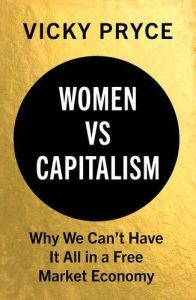Join getAbstract to access the summary!

Join getAbstract to access the summary!
Vicky Pryce
Women vs. Capitalism
Why We Can't Have It All in a Free Market Economy
Hurst Publishers, 2020
What's inside?
The gender pay gap is real, but government intervention could fix it.
Recommendation
The pay gap between men and women has emerged as an ideological litmus test: Conservatives dismiss the notion that there’s any insidious inequality at play, while liberals see the issue as an obvious shortcoming of free markets. British economist Vicky Pryce falls clearly into the latter camp. But in this nuanced look at the topic, she makes a forceful case that pay inequality is dragging down prosperity for everyone. While her arguments won’t sway diehard free-market supporters, Pryce compellingly contends that government needs to bring women further into the economic mainstream.
Summary
About the Author
Vicky Pryce is chief economics adviser at the Centre for Economics and Business Research and the former joint head of the UK Government Economic Service.

















Comment on this summary